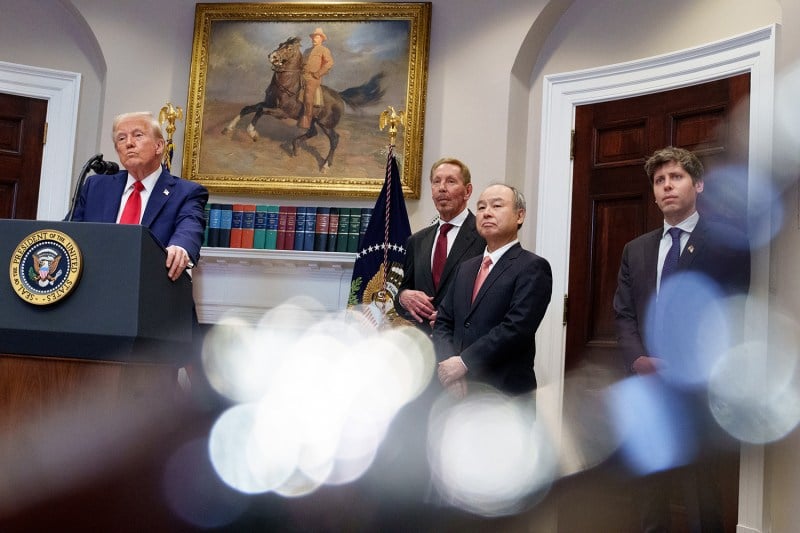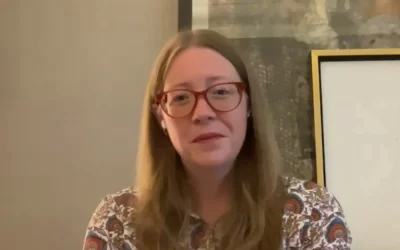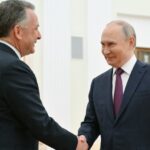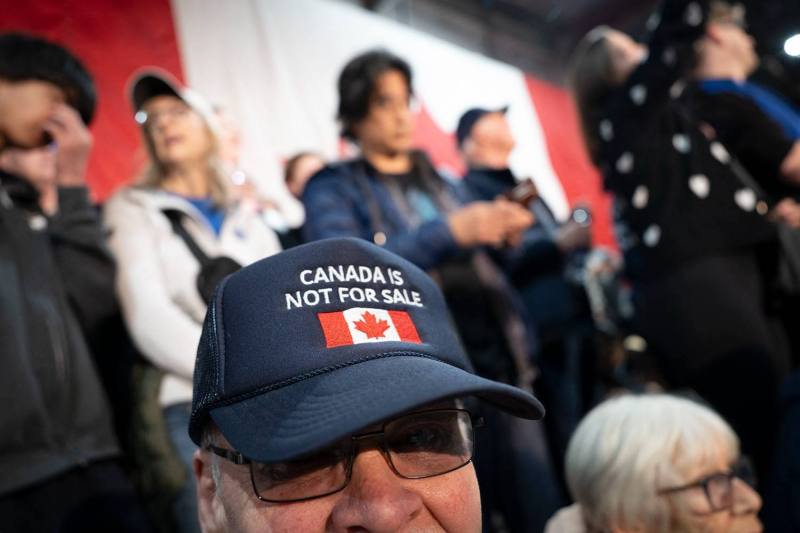How Trump Could Use Tariffs to Attract Investment

How Trump Could Use Tariffs to Attract Investment
The administration already has a blueprint—and now needs to make it work.
U.S. President Donald Trump stands next to Oracle co-founder Larry Ellison, SoftBank CEO Masayoshi Son, and OpenAI CEO Sam Altman during a press conference at the White House in Washington on Jan. 21. Andrew Harnik/Getty Images
The steep tariffs announced by U.S. President Donald Trump on April 2 rattled stock markets, redirected capital flows out of the dollar, and created doubt in the future attractiveness of the United States as a destination for investment. They also raised serious concerns that U.S. adversaries could double down on their efforts to displace the United States from the center of the global economic order.
The 90-day pause for most of the tariffs—except those against China—now gives the White House a golden opportunity to negotiate new trade and investment deals with friendly countries. These should go beyond the simple tariffs question and also make investment in the United States—especially in technology and manufacturing—easier and more attractive. The end goal should be to create a new alliance of capital that isolates China and other U.S. adversaries.
The steep tariffs announced by U.S. President Donald Trump on April 2 rattled stock markets, redirected capital flows out of the dollar, and created doubt in the future attractiveness of the United States as a destination for investment. They also raised serious concerns that U.S. adversaries could double down on their efforts to displace the United States from the center of the global economic order.
The 90-day pause for most of the tariffs—except those against China—now gives the White House a golden opportunity to negotiate new trade and investment deals with friendly countries. These should go beyond the simple tariffs question and also make investment in the United States—especially in technology and manufacturing—easier and more attractive. The end goal should be to create a new alliance of capital that isolates China and other U.S. adversaries.
The blueprint for this approach was already laid out in the Trump administration’s America First Investment Policy (AFIP) in February. If the White House implements it well, this policy could massively reshape global industrial investment, ensuring that capital is funneled to high-end manufacturing and industrial reshoring in the United States.
Although still light on details, AFIP’s approach is to substantially open up and fast-track friendly investment in U.S. industry and financial assets. The means include expedited environmental reviews and an openness to investment from the sovereign wealth funds of partner countries. Operationalized effectively, the policy could enable free and transparent investment in the United States by partner countries while setting rules and guardrails to close the door to dangerous economic manipulation by adversaries. By specifically mentioning China, Cuba, Iran, North Korea, Russia, and Venezuela, the memorandum acknowledges the growing alliance of rogue states attempting to undermine U.S. economic power and financial predominance.
Remarkably, given recent rhetoric from the administration, the role of allies and partners figures prominently in AFIP. That may seem incongruous for an administration that also imposed massive tariffs on key trading partners such as Canada, the European Union, Japan, and Mexico. Indeed, enlisting major investments, even from Washington’s traditional allies, may prove difficult now that a new trade war is creating substantial uncertainty and ill will. Following the tariff announcement, French President Emmanuel Macron immediately called on Europe to suspend planned investments in the United States, while Japanese Prime Minister Shigeru Ishiba said he warned Trump during a phone call that his new policies could hurt Japanese investment in the United States.
AFIP does not explicitly define which countries are considered allies and partners. The optimistic view is that this administration is using the terms “allies” and “partners” in more comprehensive ways than its predecessors. In this view, allies are not merely long-standing partners but those countries that more broadly share U.S. geopolitical and economic perspectives. As of now, the Trump administration seems to expect future economic allies to align with its views on trade imbalances, China, drug cartels, migration, and investment in U.S. industrial rejuvenation.
If AFIP is not undermined by a global trade war, this opens the door for a redefinition of allies beyond traditional security partners. Future economic allies might include Argentina, Israel, Japan, the Netherlands, Saudi Arabia, Singapore, South Korea, Switzerland, Turkey, and the United Arab Emirates. Traditional U.S. allies, such as the other members of the Five Eyes intelligence-sharing network—Australia, Britain, Canada, and New Zealand—will have an opportunity to invest in U.S.-based production of new technologies that will be critical for their security. These investment alliances can be arrayed against U.S. adversaries and their growing cooperation.
Early signs of new foreign direct investment include Saudi Arabia’s interest in deploying $600 million in new investments in the U.S. industrial base over the next four years; Hyundai’s announcement of $21 billion in new investments in steel, automotive technologies, and artificial intelligence; and a proposed $1 trillion investment in AI infrastructure by Japan’s SoftBank. The Trump administration has also reopened the door for Nippon Steel’s potential acquisition of U.S. Steel, ordering a fresh review of the national security concerns that the Biden administration cited to block the deal. As Ishiba’s comments indicate, conflicts over tariffs could still impede various investments and acquisitions.
The United States has enjoyed a fertile domestic investment environment because of its stability, predictability, transparency, and rules. In this regard, the administration’s actions have not been helpful. The Treasury Department’s recent statement that it will no longer require most investors to declare beneficial ownership was a misstep. Allowing malign actors to hide their identities creates blind spots that would defeat AFIP’s stated purpose. The attractiveness of U.S. assets has been directly related to respect for the rule of law and the stability of the U.S. investment system. Erratic policy decisions that degrade judicial independence, contract protections, and existing international agreements diminish the attractiveness of incoming investment.
Investment in the United States is a privilege, and it should come with certain requirements guaranteeing transparency and fair play. For those who can agree to open, free, and fair terms of engagement, the United States should roll out the red carpet to invest in what remains the world’s largest and most desirable market, as demonstrated by the vast foreign ownership of U.S. financial and industrial assets. For all other countries and entities, AFIP would establish financial walls and guardrails that limit them to passive ownership with no control, no voting rights, and no ability to weaponize U.S. assets against Americans.
The greatest potential beneficiaries may be a strange combination of new faces and old partners from Latin America, the Middle East, Central Asia, the East Asia, and Oceania. The EU, with its heavy emphasis on regulation of new technologies and actions against U.S. tech giants, may find itself on the outside looking in. Other major economies—including India, Malaysia, and South Africa—would have to disengage economically from China, Russia, or Iran if they want to continue to trade with or invest in the United States.
Global trade and investment should not remain so open that economic adversaries can weaponize that openness against the United States. For the U.S. economy to continue to lead the world, it needs new alliances and ground rules to ensure fair play, free-flowing capital, and reliable supply chains. With trade negotiations underway, incorporating a fast track for friendly capital could become an attractive item to add to any deals. If the Trump administration manages to build out its new investment policy as it resolves the tariff shock, it will have an opportunity to harness friendly foreign capital to drive U.S. innovation and growth while closing the door to those countries and entities that seek to harm U.S. national and economic security.
This post is part of FP’s ongoing coverage of the Trump administration. Follow along here.
Juan Zarate is the chairman of the Center on Economic and Financial Power at the Foundation for Defense of Democracies and a former U.S. deputy national security adviser for combatting terrorism.
Elaine Dezenski is the senior director and head of the Center on Economic and Financial Power at the Foundation for Defense of Democracies and a former acting and deputy assistant secretary for policy at the U.S. Department of Homeland Security.
More from Foreign Policy
-

An illustration shows a line of large shopping carts facing down a small Donald Trump figure holding two shopping bags. The stars of China’s flag are in the upper left corner. Why Beijing Thinks It Can Beat Trump
China’s elites have a new confidence in their own system.
-

U.S. Army Chief of Staff Randy George speaks to U.S. soldiers at the Hohenfels Training Area in southern Germany on Feb. 6. A Drawdown of U.S. Forces in Europe Is All but Certain
Here’s how the Pentagon can rebalance its approach to the continent without sacrificing U.S. interests.
-

University of California, Los Angeles students, researchers, and demonstrators rally during a “Kill the Cuts” protest against the Trump administration’s funding cuts on research, health, and higher education in Los Angeles on April 8. Why Authoritarians Attack Universities First
A Yale professor and expert on fascism talks about why he’s leaving the United States under Trump.
-

Dwight D. Eisenhower looks over a piece of paper while sitting on a couch as Robert Cutler looks over his shoulder. How Generations of Experts Built U.S. Power
And now Trump is throwing it all away.










Join the Conversation
Commenting on this and other recent articles is just one benefit of a Foreign Policy subscription.
Already a subscriber?
.
Subscribe
Subscribe
View Comments
Join the Conversation
Join the conversation on this and other recent Foreign Policy articles when you subscribe now.
Subscribe
Subscribe
Not your account?
View Comments
Join the Conversation
Please follow our comment guidelines, stay on topic, and be civil, courteous, and respectful of others’ beliefs.
Change your username |
Log out
Change your username:
CANCEL
Confirm your username to get started.
The default username below has been generated using the first name and last initial on your FP subscriber account. Usernames may be updated at any time and must not contain inappropriate or offensive language.